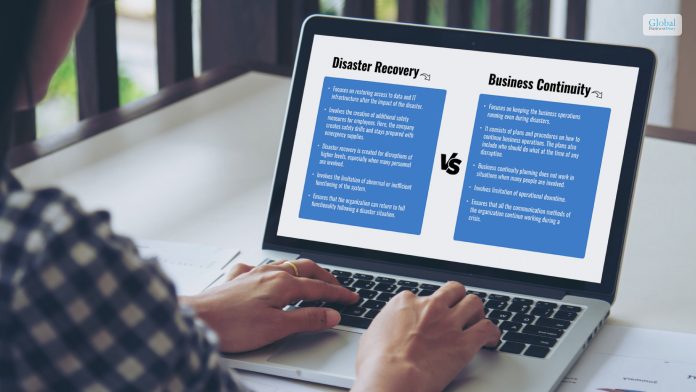Disaster Recovery Vs Business Continuity – What Are The Differences?

Disaster recovery vs business continuity: Which one is important? – The short answer is “Both.” It depends on the situation you are dealing with.
Most companies operate by assuming that their workplaces will maintain their consistent state with changing times. Hence, they try to find comfort in daily routines and rhythm of work. However, there are certain events when a business might face disruption.
Hence, businesses need to have a disaster recovery plan and a business continuity plan in place to ensure that the business recovers faster when it comes across a negative situation.
In this article, you will learn about disaster recovery and business continuity in general. However, the focus of the article will be on the differences between the two. Apart from those differences, we will also discuss the major similarities between them as well. In addition to this, we will, in brief, share with you how each of these works and how to implement them. Hence, to learn more, read on through to the end of the article.
Disaster Recovery Vs Business Continuity – What Are They?
If you want to prepare for disruptions in business, you will need to create various strategies and plans, following which you will be able to ensure that the core business functions are intact. This can help the business to come back faster from the uncertain negative consequences it just faced.
What Is Disaster Recovery?
Amazon Web Services defines disaster recovery as such –
“Disaster recovery is the process by which an organization anticipates and addresses technology-related disasters. The process of preparing for and recovering from any event that prevents a workload or system from fulfilling its business objectives in its primary deployed location, such as power outages, natural events, or security issues.”
To measure the targets of disaster recovery, two factors are taken – Recovery Point Objectives (RPO) and Recovery Time Objectives (RTO). The failures for which companies make disaster recovery plans are mostly larger-scale disaster events. The plan includes various procedures and policies for the company so that it can recover quickly from the disaster by following them.
What Is Business Continuity?
According to the Business Continuity Institute,
“Business continuity is about having a plan to deal with difficult situations so your organization can continue to function with as little disruption as possible. Whether it’s a business, public sector organization, or charity, you need to know how you can keep going under any circumstances.”
You will need a business continuity plan, too, in case of a disaster situation. However, the continuity plan is to deal with the disaster situation so that the organization is able to continue its functioning with little to no disruption.
However, you will need to understand here that a business continuity plan does not work at times of a large program or a disaster, which affects the company a lot. It also does not work when a large number of people are associated with a single plan. Hence, many big companies make business continuity plans for each of their departments. This makes each department implement the plan as per its needs.
Disaster Recovery Vs Business Continuity – Major Differences
| Disaster Recovery | Business Continuity |
|---|---|
| Focuses on restoring access to data and IT infrastructure after the impact of the disaster.Involves the creation of additional safety measures for employees. Here, the company creates safety drills and stays prepared with emergency supplies.Disaster recovery is created for disruptions of higher levels, especially when many personnel are involved.Involves the limitation of abnormal or inefficient functioning of the system.Ensures that the organization can return to full functionality following a disaster situation. | Focuses on keeping the business operations running even during disasters.It consists of plans and procedures on how to continue business operations. The plans also include who should do what at the time of any disruption.Business continuity planning does not work in situations when many people are involved.Involves limitation of operational downtime.Ensures that all the communication methods of the organization continue working during a crisis. |
You can see from this table that both disaster recovery and business continuity are complementary to each other. Businesses need to combine both plans to ensure they are prepared for disastrous events.
Disaster Recovery Vs Business Continuity – Major Similarities
The following are some of the major similarities that you will find between disaster recovery and business continuity:
- Both are proactive strategies that enable a business to stay prepared for uncertain and disastrous events.
- Both plans allow the company to minimize the effects of the disaster before it actually occurs and affects the business.
- Both work quite well in situations of natural and man-made disasters. However, the result of their implementation depends on the situation.
- Professionals need to review both plans on a regular basis, and some of them need revision with the evolving situation of the organization.
How Do Disaster Recovery And Business Continuity Work?
According to the University of Central Florida,
“Having business continuity and disaster recovery plans in place can help companies minimize the consequences of a catastrophic event. They can also provide peace of mind; employees and business owners alike may feel more comfortable in a work setting where there are clear policies for how to respond to disasters.”
To implement these plans for the recovery of the business, the organization needs to create/hire crisis management professionals. These professionals will be responsible for developing and implementing such plans. Apart from that, they are also responsible for evaluating and revising them as per needs and training the employees of the organization to stay prepared.
Final Thought
Disaster recovery vs business continuity: Hope this article was helpful for you in getting a better idea of both of these terms and how they operate in the organizational setting.
Disaster recovery works in situations when the disruption is big and many people are involved. On the other hand, business continuity planning is to ensure business operations are continued in disruptions.
Do you have any more recommendations regarding when and how to implement a business continuity plan and a disaster recovery plan? Share your thoughts and ideas with us in the comments section below.
Read More:













